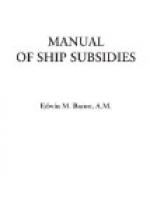Summarized, the various grants of the various nations thus appear:
Great Britain grants mail subsidies, and admiralty subventions; her colonies, steamship subsidies.
France: mail subsidies; construction and navigation bounties; fisheries bounties.
Germany: mail subsidies; steamship subsidies; preferential rates on the State railroads for shipbuilding materials.
Belgium: premiums to certain steamship lines; pilotage refunds.
Austria-Hungary: mail subsidies; construction and navigation bounties; Suez Canal refunds. Hungary; bounties to Hungarian ships.
Italy: mail subsidies; construction and navigation bounties.
Spain: mail subsidies; construction and navigation bounties.
Portugal: mail subventions to steamship companies.
Denmark: trade subsidies; exemptions from harbor dues.
Sweden: State contributions—loans to steamship companies.
Norway: State contributions; trade subsidies.
Russia: mail subsidies; mileage subsidies; Government loans; steamship subsidies; Suez Canal refunds.
Japan: State aid to steamship companies; mail subsidies; construction and navigation bounties; fisheries bounties.
China: State aid to steamship companies; subsidies to ship-yards.
South America: Brazil and Argentina, subsidies to foreign steamship companies.
United States: mail subsidies to seven steamship lines.
The United States confines the coastwise trade to American ships, and these are exempted from tonnage dues. It excludes foreign-built ships from American registry, admitting only American ships, or those taken in war as prizes or forfeited for a breach of United States laws, belonging to American citizens.[IN] Ownership of American ships is restricted to “citizens of the United States, or a corporation organized under the laws of any of the States thereof."[IO] The master of an American ship, and all officers in charge of a watch, including the pilots, must be American citizens. Since 1871 foreign materials for ship-building have been admitted free of duty. Since 1909 such materials, and all articles necessary for the outfit and equipment of ships, have been duty-free, with this proviso: that vessels receiving these rebates of duties “shall not be allowed to engage in the coastwise trade of the United States more than six months in any one year,” except upon repayment of the duties remitted; and that vessels built for foreign account and ownership shall not engage in this trade.[IP]
In 1910 the subsidized American service covered only the one transatlantic line from New York to Southampton, calling at Plymouth and Cherbourg; lines to the north coast of South America—to Venezuela; to Mexico; to Havana; to Jamaica; and on the Pacific, from San Francisco to Tahiti.




